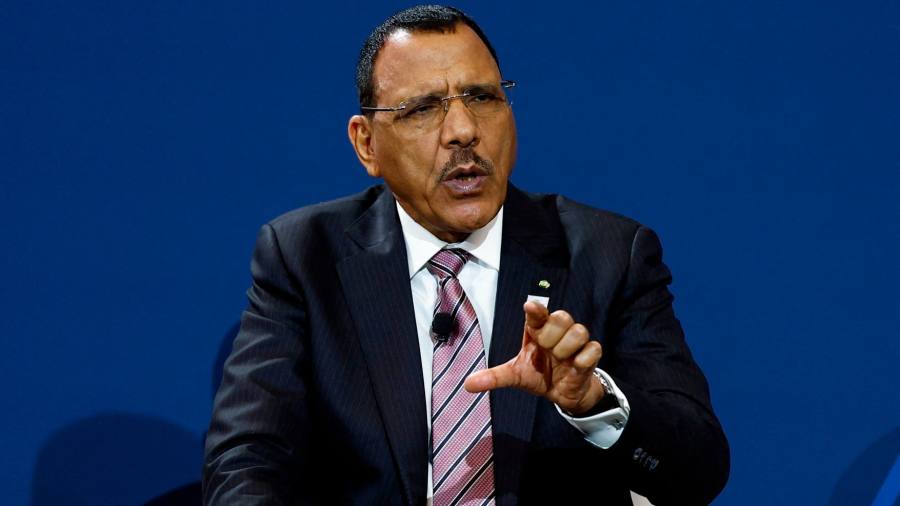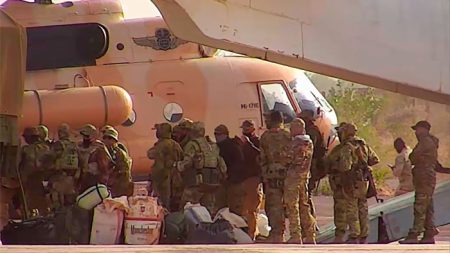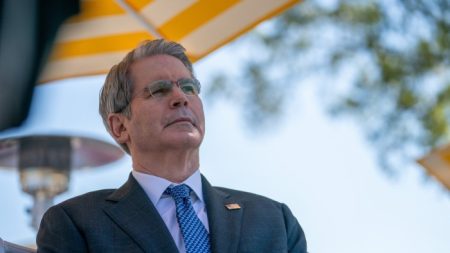Receive free Niger updates
We’ll send you a myFT Daily Digest email rounding up the latest Niger news every morning.
Soldiers belonging to Niger’s presidential guard have blockaded Mohamed Bazoum inside his official residence and prevented him from leaving, in an attempted coup against the pro-western leader.
Niger’s armed forces responded to the move on Wednesday by in turn surrounding the presidential compound, saying they backed Bazoum against disgruntled elements within the presidential guard.
The army had also secured “major strategic points” in the country and was on the side of “legality”, according to a statement apparently issued by the armed forces. The army also remained loyal to the president who was safe alongside his family, it said.
The move against Bazoum comes after military takeovers in neighbouring Mali and Burkina Faso, which were followed by sharp moves away from the west. The leaders of Mali’s 2021 coup expelled French troops and invited Russia’s Wagner Group to help fight an Islamist insurgency that has taken over swaths of the country.
Bazoum, who was elected in 2021, has by contrast welcomed French troops who were expelled from Mali and has courted both European and US help in combating jihadist attacks in Niger’s border regions. In an interview with the Financial Times in May, he defended France’s presence and blamed anti-French sentiment on targeted campaigns.
He has also paraded his pro-democracy credentials and progressive attitudes on women’s rights and education to court western support. Bazoum was one of several African leaders who has elected not to attend Vladimir Putin’s Russia-Africa summit in St Petersburg this week.
“Those attempting this coup will maybe surrender or they’ll maybe have a battle on the grounds of the presidential palace,” said a Niamey resident who was following events closely. “The situation is very dangerous. Things can change from minute to minute ”
Though details about events in Niger were still emerging, one person in contact with army commanders said they were trying to persuade the presidential guard to abort the rebellion. “If they don’t, there could be a bloodbath,” he said.
Earlier reports indicated that General Omar Tchani, head of the presidential guard, had asked Bazoum to resign — a request the president had refused.
The Economic Community of West African States denounced an “attempted coup d’etat”, saying it condemned “in the strongest terms the attempt to seize power by force and calls on the coup plotters to free the democratically elected president”.
A post on the Niger president’s Twitter account published as the coup attempt was unfolding stated that “the army and the National Guard are ready to attack the elements of the [presidential guard] involved”.
A close associate of Bazoum who was in contact with him on Wednesday said the president had woken and had his breakfast as normal, but was then prevented by the presidential guard from leaving his home. His own bodyguards were locked outside, he said.
Since his election, Bazoum, who comes from a minority Arab clan, has been slowly consolidating what was considered a fragile power base by appointing his own men to important positions in the security apparatus.
Several people appointed by Mahamadou Issoufou, Bazoum’s predecessor, had been quietly retired. A move to retire Tchani, which was to be announced on Wednesday, may have triggered the rebellion, observers said.
“Bazoum has been navigating a delicate political path,” said Paul Melly, a specialist oh the Sahel region at Chatham House think-tank. “It was going to be a gentle process of gradually establishing himself as his own man.”
Under Bazoum, Melly said, the army had been given money, equipment and training from Europe and the US, securing greater loyalty. It had held jihadis at bay far more effectively than counterparts in Mali or Burkina Faso, he added.
A political analyst in Niamey said that, while much was at stake, he thought a coup could still be averted. “Countries in the region that have gone through coups have shifted completely their relationship from being pro-western to siding with Russia. Bazoum has taken the opposite position,” he said.
“If a coup goes through, that would change the dynamic. He’s almost the only western ally in the region still standing.”
Read the full article here















